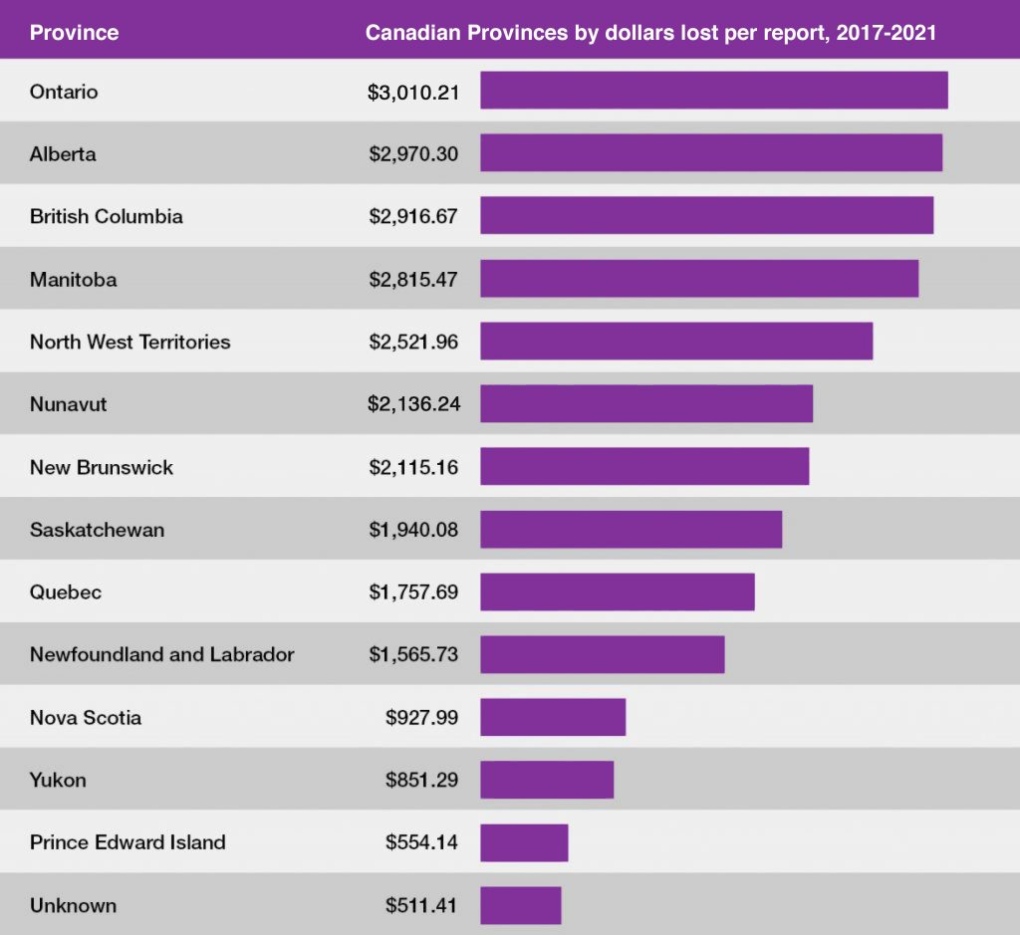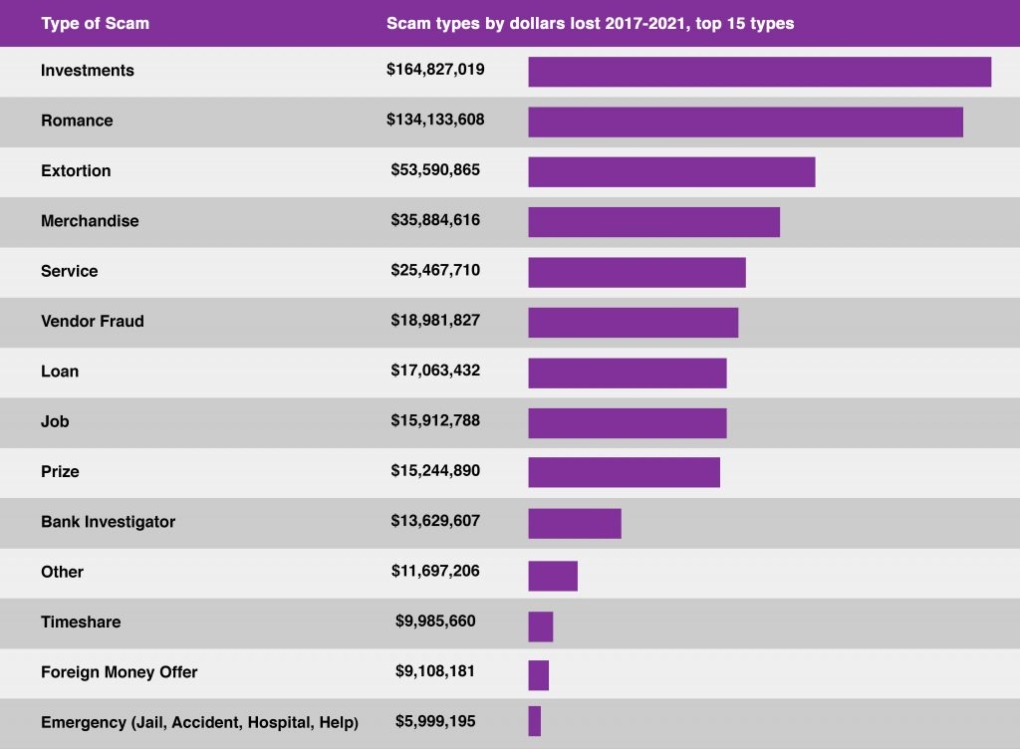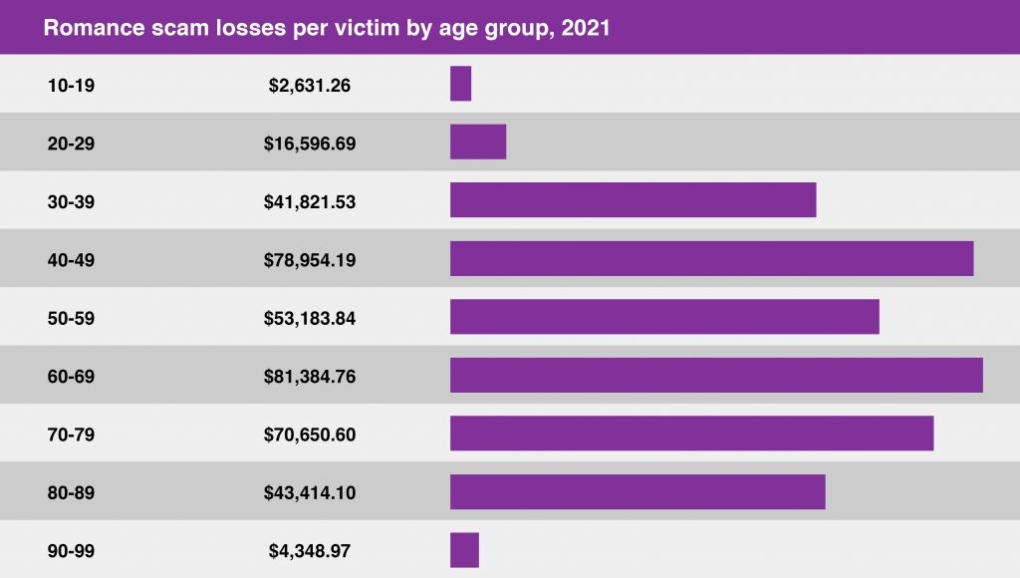How much money B.C. scam victims lose on average, compared to others
 (Shutterstock)
(Shutterstock)
British Columbians are among those who lose the most money on average to scams.
A just-published study suggests that victims in B.C. lose an average of about $3,000 – a similar sum to what's seen in Ontario and Alberta.
According to the study from Social Catfish, which used data from the Canadian Anti-Fraud Centre collected over the last five years, B.C. victims lose the third-most amount of money on average.
That average, the group said, is $2,916.67, down slightly from the $3,010.21 Ontarians lose, and from $2,970.30 in Alberta.
The province or territory where victims have lost the least amount of money is Prince Edward Island, where the average is $554.14.
The study did not suggest that means residents of those provinces are more or less tech-savvy, and when it comes to reported complaints, B.C. was sixth.
According to Social Catfish, the rate of CAFC complaints in B.C. is 249 per 100,000 residents. Manitoba actually had the highest rate of reported scam victims, followed by Ontario and Yukon.
 (Social Catfish)
(Social Catfish)
DETAILS AND ADVICE
As for how fraudsters are tricking their victims, the most common scam in Canada involves investment. Canadians lost a whopping $165 million between 2017 and 2021 to opportunities billed as once-in-a-lifetime, can't-miss deals.
These scams are often sent by email or social media, and promise a high rate of return for little risk. The would-be investor transfers money, then never sees it again.
Often these scams involve cryptocurrency such as Bitcoin.
As for how to avoid falling for it, experts advise those approached to research the person or company, and consult a third-party financial advisor.
The second most-costly scams prey on a different emotion: love.
Canadians lost $134 million to romance scams in the five-year period involved in the study. Scammers involved in these will use social media or dating apps to approach their victims and earn their trust, then start faking emergencies.
They ask for money, get as much as they can from the target, then disappear.
To protect yourself, experts advise, refuse to give money to anyone not willing to meet in person or use video chat.
Another tip is to save the photo or photos the person is using and run them through a reverse image search, to see if the photos are their own. To do this, go to Google Images in a web browser and upload the image or images by clicking the camera icon in the search bar, then look through the results.
And another $54 million was lost during the same period to extortion scams. These include emails and phone calls from "police" or similar agencies accusing the target of serious criminal offences.
Scammers will tell the victim to respond to a fake email address if they want to avoid jail time, then ask for money and other personal information.
Police and other law enforcement agencies will never demand cash or threaten to make an arrest by phone or email, so potential victims can be confident that these approaches are fake.
 (Social Catfish)
(Social Catfish)
WHO ARE THE VICTIMS?
According to the study, the most vulnerable age group is 60 to 69.
In a breakdown of dollars lost by age group to romance scams specifically, this was still true, but people between the ages of 40 and 59, as well as 70 to 79, also lost significant amounts of money, and people in their 30s and 80s were not that far behind.
The average loss by all Canadians to these scams was about $54,000, but some were more likely than others.
Based on CAFC data, victims under 20 lost an average of $2,631.26, and victims over 90 lost $4,348.97.
Victims in their 60s lost the most, at $81,384.76, followed by people in their 40s who were scammed out of nearly $79,000.
According to the CAFC, there had been 29,294 reports of all types of fraud involving 18,609 victims this year, as of the end of April. Those victims lost approximately $163.9 million.
 (Social Catfish)
(Social Catfish)
CTVNews.ca Top Stories

Quebec nurse had to clean up after husband's death in Montreal hospital
On a night she should have been mourning, a nurse from Quebec's Laurentians region says she was forced to clean up her husband after he died at a hospital in Montreal.
Northern Ont. lawyer who abandoned clients in child protection cases disbarred
A North Bay, Ont., lawyer who abandoned 15 clients – many of them child protection cases – has lost his licence to practise law.
Bank of Canada officials split on when to start cutting interest rates
Members of the Bank of Canada's governing council were split on how long the central bank should wait before it starts cutting interest rates when they met earlier this month.
'Life was not fair to him': Daughter of N.B. man exonerated of murder remembers him as a kind soul
The daughter of a New Brunswick man recently exonerated from murder, is remembering her father as somebody who, despite a wrongful conviction, never became bitter or angry.
Cuban government apologizes to Montreal-area family after delivering wrong body
Cuba's foreign affairs minister has apologized to a Montreal-area family after they were sent the wrong body following the death of a loved one.
What is changing about Canada's capital gains tax and how does it impact me?
The federal government's proposed change to capital gains taxation is expected to increase taxes on investments and mainly affect wealthy Canadians and businesses. Here's what you need to know about the move.
'It was instant karma': Viral video captures failed theft attempt in Nanaimo, B.C.
Mounties in Nanaimo, B.C., say two late-night revellers are lucky their allegedly drunken antics weren't reported to police after security cameras captured the men trying to steal a heavy sign from a downtown business.
'Anything to win': Trudeau says as Poilievre defends meeting protesters
Prime Minister Justin Trudeau is accusing Conservative Leader Pierre Poilievre of welcoming 'the support of conspiracy theorists and extremists,' after the Conservative leader was photographed meeting with protesters, which his office has defended.
'One of the single most terrifying things ever': Ontario couple among passengers on sinking tour boat in Dominican Republic
A Toronto couple are speaking out about their 'extremely dangerous' experience on board a sinking tour boat in the Dominican Republic last week.






























